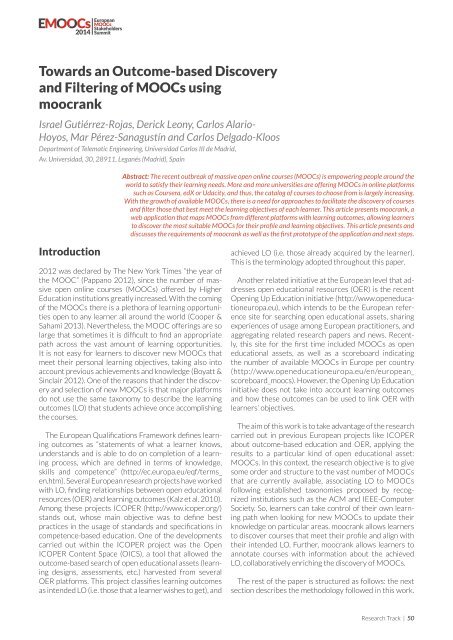zmWmQs
zmWmQs
zmWmQs
You also want an ePaper? Increase the reach of your titles
YUMPU automatically turns print PDFs into web optimized ePapers that Google loves.
Towards an Outcome-based Discovery<br />
and Filtering of MOOCs using<br />
moocrank<br />
Israel Gutiérrez-Rojas, Derick Leony, Carlos Alario-<br />
Hoyos, Mar Pérez-Sanagustín and Carlos Delgado-Kloos<br />
Department of Telematic Engineering, Universidad Carlos III de Madrid,<br />
Av. Universidad, 30, 28911, Leganés (Madrid), Spain<br />
Abstract: The recent outbreak of massive open online courses (MOOCs) is empowering people around the<br />
world to satisfy their learning needs. More and more universities are offering MOOCs in online platforms<br />
such as Coursera, edX or Udacity, and thus, the catalog of courses to choose from is largely increasing.<br />
With the growth of available MOOCs, there is a need for approaches to facilitate the discovery of courses<br />
and filter those that best meet the learning objectives of each learner. This article presents moocrank, a<br />
web application that maps MOOCs from different platforms with learning outcomes, allowing learners<br />
to discover the most suitable MOOCs for their profile and learning objectives. This article presents and<br />
discusses the requirements of moocrank as well as the first prototype of the application and next steps.<br />
Introduction<br />
2012 was declared by The New York Times “the year of<br />
the MOOC” (Pappano 2012), since the number of massive<br />
open online courses (MOOCs) offered by Higher<br />
Education institutions greatly increased. With the coming<br />
of the MOOCs there is a plethora of learning opportunities<br />
open to any learner all around the world (Cooper &<br />
Sahami 2013). Nevertheless, the MOOC offerings are so<br />
large that sometimes it is difficult to find an appropriate<br />
path across the vast amount of learning opportunities.<br />
It is not easy for learners to discover new MOOCs that<br />
meet their personal learning objectives, taking also into<br />
account previous achievements and knowledge (Boyatt &<br />
Sinclair 2012). One of the reasons that hinder the discovery<br />
and selection of new MOOCs is that major platforms<br />
do not use the same taxonomy to describe the learning<br />
outcomes (LO) that students achieve once accomplishing<br />
the courses.<br />
The European Qualifications Framework defines learning<br />
outcomes as “statements of what a learner knows,<br />
understands and is able to do on completion of a learning<br />
process, which are defined in terms of knowledge,<br />
skills and competence” (http://ec.europa.eu/eqf/terms_<br />
en.htm). Several European research projects have worked<br />
with LO, finding relationships between open educational<br />
resources (OER) and learning outcomes (Kalz et al. 2010).<br />
Among these projects ICOPER (http://www.icoper.org/)<br />
stands out, whose main objective was to define best<br />
practices in the usage of standards and specifications in<br />
competence-based education. One of the developments<br />
carried out within the ICOPER project was the Open<br />
ICOPER Content Space (OICS), a tool that allowed the<br />
outcome-based search of open educational assets (learning<br />
designs, assessments, etc.) harvested from several<br />
OER platforms. This project classifies learning outcomes<br />
as intended LO (i.e. those that a learner wishes to get), and<br />
achieved LO (i.e. those already acquired by the learner).<br />
This is the terminology adopted throughout this paper.<br />
Another related initiative at the European level that addresses<br />
open educational resources (OER) is the recent<br />
Opening Up Education initiative (http://www.openeducationeuropa.eu),<br />
which intends to be the European reference<br />
site for searching open educational assets, sharing<br />
experiences of usage among European practitioners, and<br />
aggregating related research papers and news. Recently,<br />
this site for the first time included MOOCs as open<br />
educational assets, as well as a scoreboard indicating<br />
the number of available MOOCs in Europe per country<br />
(http://www.openeducationeuropa.eu/en/european_<br />
scoreboard_moocs). However, the Opening Up Education<br />
initiative does not take into account learning outcomes<br />
and how these outcomes can be used to link OER with<br />
learners’ objectives.<br />
The aim of this work is to take advantage of the research<br />
carried out in previous European projects like ICOPER<br />
about outcome-based education and OER, applying the<br />
results to a particular kind of open educational asset:<br />
MOOCs. In this context, the research objective is to give<br />
some order and structure to the vast number of MOOCs<br />
that are currently available, associating LO to MOOCs<br />
following established taxonomies proposed by recognized<br />
institutions such as the ACM and IEEE-Computer<br />
Society. So, learners can take control of their own learning<br />
path when looking for new MOOCs to update their<br />
knowledge on particular areas. moocrank allows learners<br />
to discover courses that meet their profile and align with<br />
their intended LO. Further, moocrank allows learners to<br />
annotate courses with information about the achieved<br />
LO, collaboratively enriching the discovery of MOOCs.<br />
The rest of the paper is structured as follows: the next<br />
section describes the methodology followed in this work.<br />
Research Track | 50


